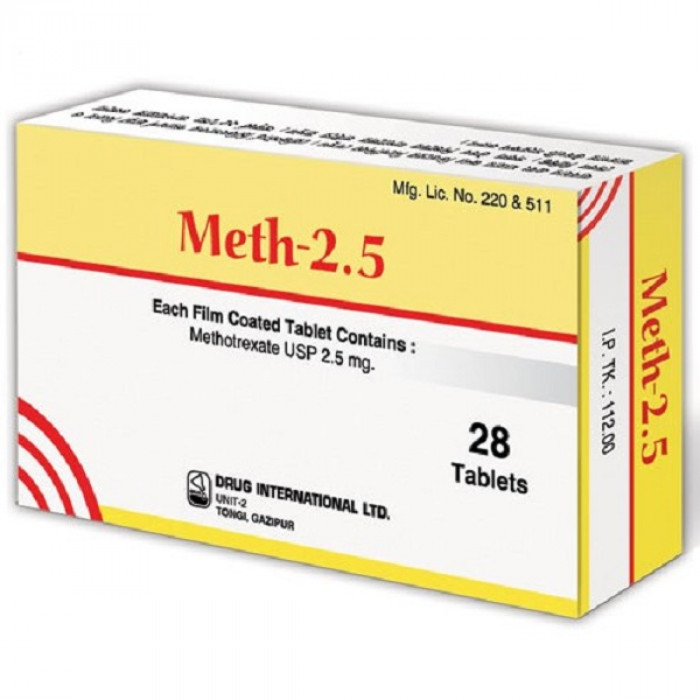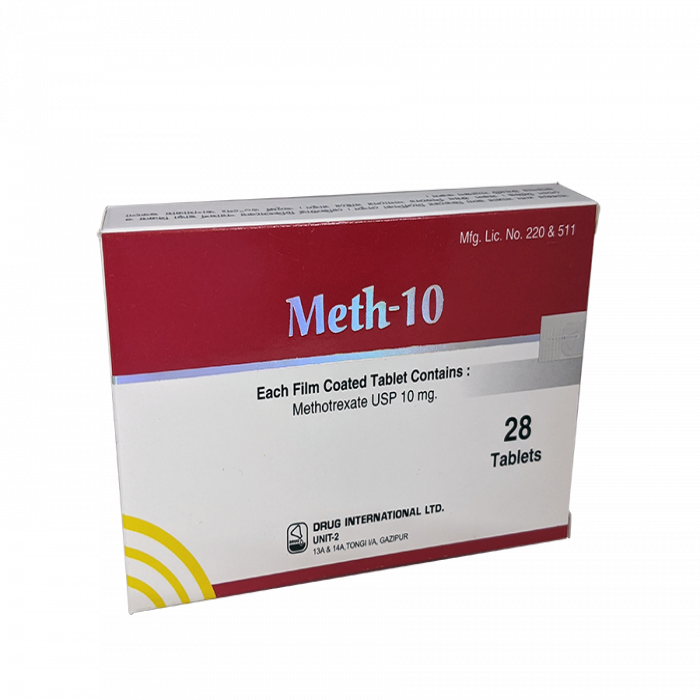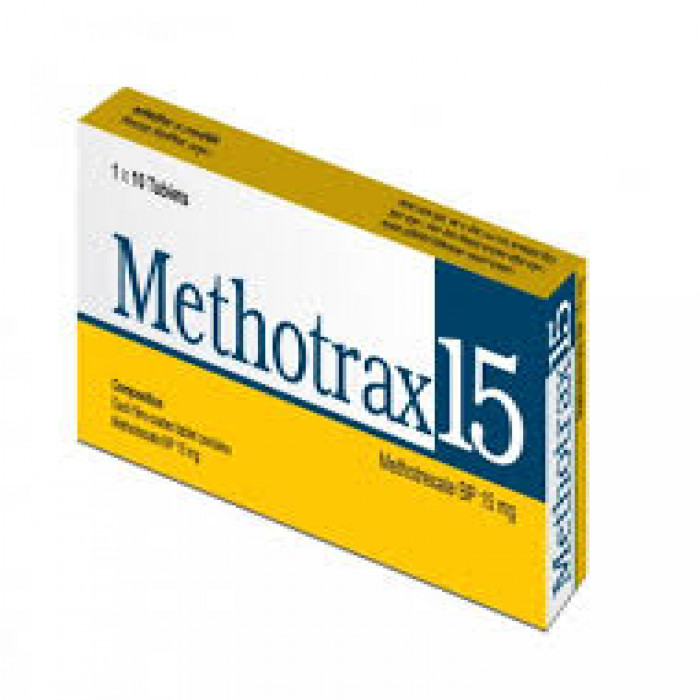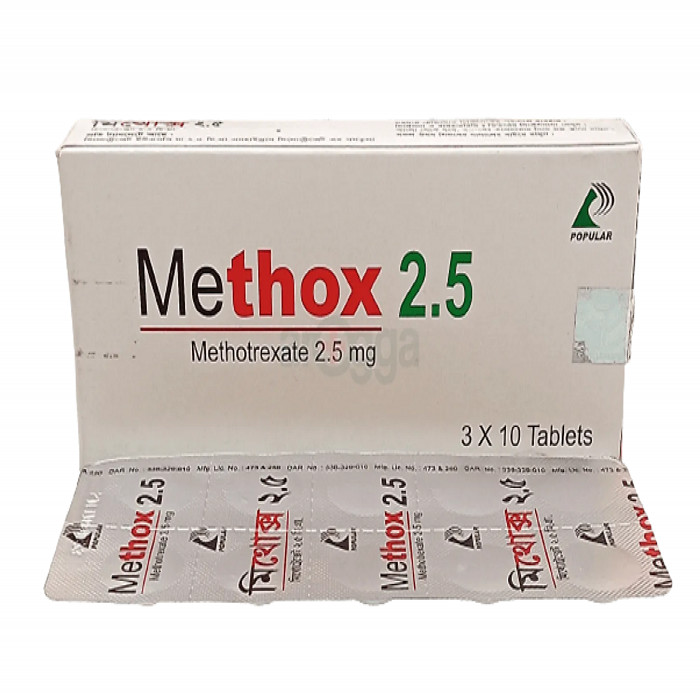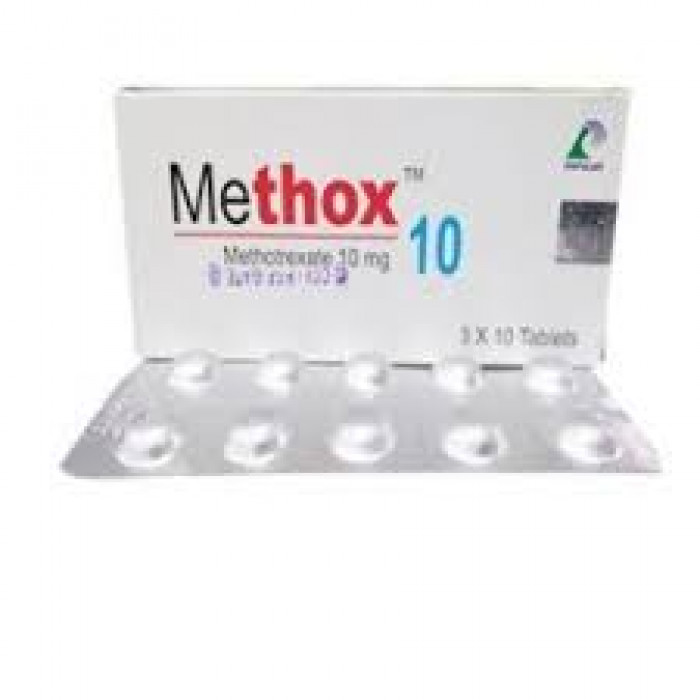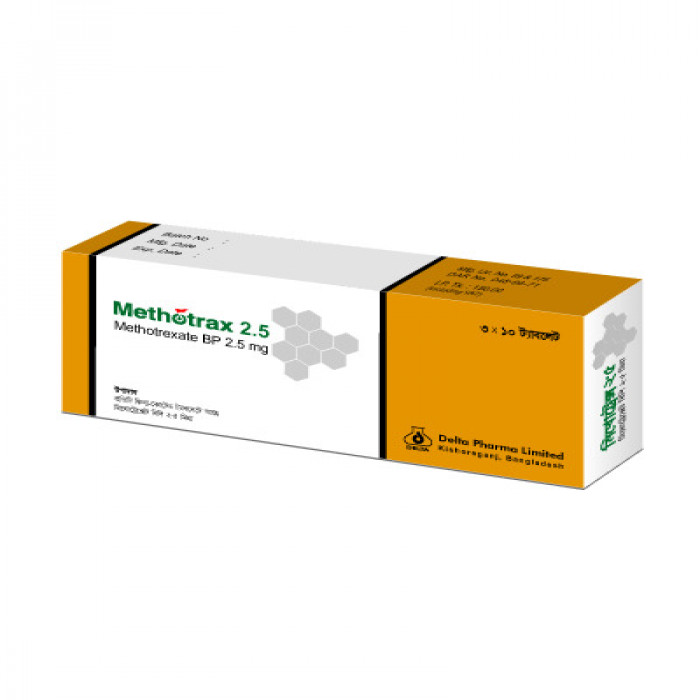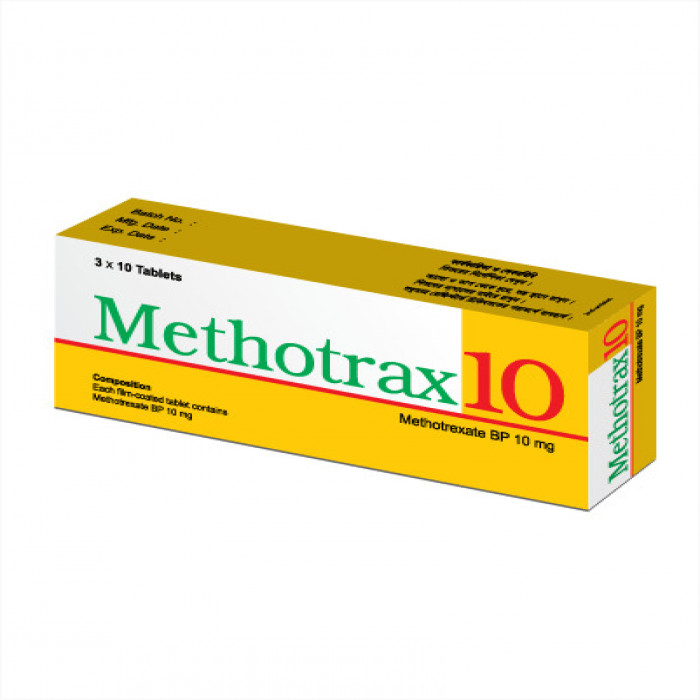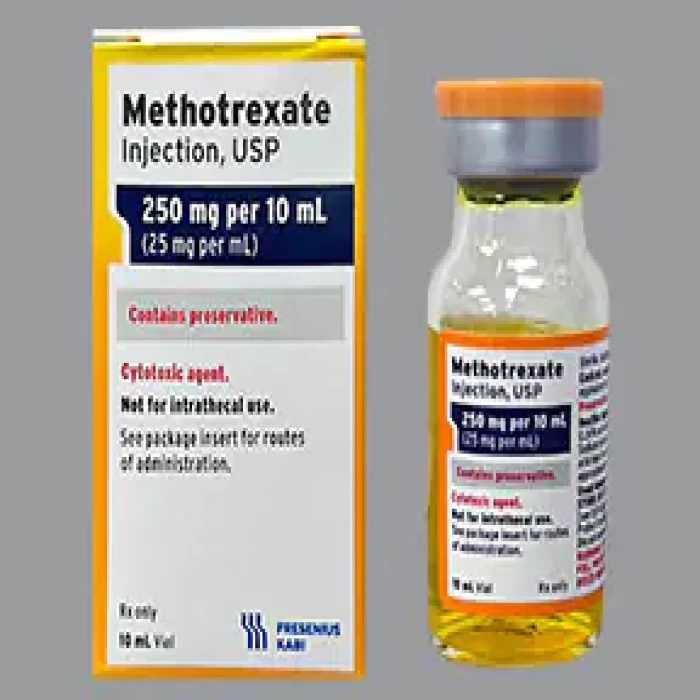
✔ 100% Authentic Product
👁️ Currently Viewing 4182
Manufacturer/Distributor: Choongwae/Nts Generic Name: Methotrexate 50mg/vial Injection
Discount
Price: ৳ 122
MRP:
৳
129.47
6%
Off
✅ Description:
Introduction
MTX is a medicine used to treat rheumatoid arthritis where it can prevent further joint damage. It is also used to treat severe forms of a skin disease called psoriasis by killing cells in the skin which are growing too quickly. MTX may be used alone or in combination with other medicines. You should take it exactly as your doctor has advised. Taking it too much can cause very serious side effects. It may take several weeks or months for you to see or feel the benefits but do not stop taking it unless your doctor tells you to. You should avoid drinking alcohol as it may increase your risk of liver damage. The most common side effects of this medicine include nausea, vomiting, loss of appetite, abdominal pain, tiredness, and mouth sores. Your doctor may advise you to take folic acid to reduce some of these. If they do not go away or get worse, tell your doctor. There may be ways of preventing or reducing these effects. It is a very strong medicine and some people may develop serious side effects while taking it. This medicine may lower your ability to fight infections and lead to problems with your blood, liver or kidneys. Your doctor will advise you regular blood tests to check for these. Before taking it, tell your doctor if you are pregnant, have problems related to stomach, liver or kidney or are taking any medicines to treat infections. Many other medicines can affect, or be affected by, this medicine so let your healthcare team know all medications you are using. This medicine is not recommended during pregnancy or while breastfeeding. It may harm your baby. You and your partner should avoid becoming pregnant or fathering a child for several months after your treatment with it has stopped. Your doctor may perform several tests such as blood tests, x-rays and physical examinations both before and during treatment with this medicine.
Uses of MTX
Rheumatoid arthritis
Psoriasis
Side effects of MTX
Common
Abdominal pain
Indigestion
Loss of appetite
Nausea
Vomiting
Tiredness
Mouth sore
How to use MTX
Take this medicine in the dose and duration as advised by your doctor. Swallow it as a whole. Do not chew, crush or break it. MTX may be taken with or without food, but it is better to take it at a fixed time.
How MTX works
MTX is an immunosuppressant. In rheumatoid arthritis, it works by decreasing the activity of the body's immune system. This decreases swelling, reduces pain and stiffness, and improves function. In psoriasis, it works by slowing down the rapid growth of skin cells.

Quick Tips
Take it once a week, on the same day every week.
Drink plenty of liquids to stay hydrated while taking this medication.
Always take folic acid as advised by your doctor. This will help lessen the side effects of this medicine.
It may take 6 to 8 weeks for MTX to work. Keep taking the medication as prescribed.
Avoid drinking alcohol while taking this medicine as it may increase the risk of side effects.
It can be harmful to an unborn baby. Avoid pregnancy for at least 6 months after your last dose.

Brief Description
Indication
Burkitt's lymphoma, Choriocarcinoma, Mycosis fungoides, Crohn's disease, Psoriasis, Osteosarcoma, Breast cancer, lymphosarcoma, Acute lymphoblastic leukaemia, Rheumatoid arthritis
Administration
Should be taken on an empty stomach. Best taken on an empty stomach. May be taken w/ meals to reduce GI discomfort. Avoid taking w/ milk-rich products. IV/IM Preparation Reconstitute with D5W or NS: 20-mg vial, up to 25 mg/mL; 1-g vial, up to 50 mg/mL May dilute further for IV infusion IV/IM Administration Administer by IM, IV push, or IV infusion Regular IV given with no more than 25 mg/mL IV push: Administered at 10 mg/min IV infusion (usually >100 mg): Administered over 30 minutes to 4 hours, or according to institutional protocol High-dose therapy (uses 1-g vial): Administered over 4 hours Specific dosing schemes vary, but high doses should be followed by leucovorin 24 hours after initiation of therapy to prevent toxicity
Adult Dose
Adult: PO Burkitt's lymphoma 10-25 mg/day for 4-8 days, repeat after 7-10 days. Choriocarcinoma 15-30 mg/day for 5 days, repeat after an interval of at least 1 wk for 3-5 courses. Mycosis fungoides 2.5-10 mg/day to induce remission. Rheumatoid arthritis 7.5 mg once wkly, adjust if needed. Up to 20 mg/wk. Crohn's disease 12.5-22.5 mg once wkly for up to 1 yr. PO/IV/IM Psoriasis 10-25 mg once wkly, adjust subsequent doses if needed. IV Osteosarcoma 12-15 g/m2 as infusion, followed by folinic acid. Breast cancer 10-60 mg/m2 often w/ cyclophosphamide and fluorouracil. Advanced lymphosarcoma Up to 30 mg/kg, followed by folinic acid rescue. Acute lymphoblastic leukaemia Maintenance: 2.5 mg/kg every 14 days. PO/IM Acute lymphoblastic leukaemia Maintenance: 15 mg/m2 1-2 times/wk w/ other agents. IM Choriocarcinoma 15-30 mg/day for 5 days. Repeat after at least 1 wk for 3-5 courses. Mycosis fungoides 50 mg/wk in 1-2 divided doses. Crohn's disease 25 mg once wkly for 16 wk. Maintenance: 15 mg/wk. Intrathecal Meningeal leukaemia 12 mg/m2 (Max: 15 mg) once wkly for 2-3 wk, then once mthly. Hepatic impairment Bilirubin 3.1-5.0 mg/dL or AST > 3 times ULN: Give 75% of dose Bilirubin >5.0 mg/dL: Avoid use
Child Dose
Polyarticular Juvenile Idiopathic Arthritis Initial: 10 mg/m² PO/IM/SC qWeek Meningeal Leukemia <1 year: 6 mg intrathecally (IT) every 2-5 days 1-2 years: 8 mg IT every 2-5 days 2-3 years: 10 mg IT every 2-5 days >3 years: 12 mg IT every 2-5 days
Renal Dose
Renal impairment: CrCl (ml/min) Dosage Recommendation 61-80 75% of dose 51-60 70% of dose 10-50 30-50% of dose <10 Avoid use Intermittent hemodialysis: 50% of dose at normal dosing interval Continuous renal replacement therapy: 50% of dose at normal dosing interval
Contraindication
Severe renal or hepatic impairment, pre-existing profound bone marrow suppression in patients with psoriasis or rheumatoid arthritis, alcoholic liver disease, AIDS, pre-existing blood dyscrasias, pregnancy (in patients with psoriasis or rheumatoid arthritis), breast-feeding.
Mode of Action
Methotrexate is a folic acid antagonist that inhibits DNA synthesis. It irreversibly binds to dihydrofolate reductase, inhibiting the formation of reduced folates, and thymidylate synthetase, resulting in inhibition of purine and thymidylic acid synthesis.
Precaution
Hepatic or renal impairment, bone marrow depression, elderly, neonates. Ulcerative disorders of the GI tract. Monitor haematological, renal and hepatic function, and GI toxicity regularly. Lactation: Drug excreted in breast milk; do not nurse
Side Effect
>10% Arachnoiditis with intrathecal administration,Subacute toxicity with intrathecal administration (paralysis of extremities, cranial nerve palsy, seizure or coma),Demyelinating encephalopathy with cranial irradiation or other systemic chemotherapy,Reddening of skin,Hyperuricemia,Ulcerative stomatitis,Glossitis,Gingivitis,Nausea and vomiting,Diarrhea,Anorexia,Intestinal perforation,Mucositis (dose-dependent),Leukopenia,Thrombocytopenia,Renal failure,Azotemia,Nephropathy,Pharyngitis 1-10% Alopecia,Photosensitivity,Rash,Abdominal distress,Malaise,Fatigue,Chills, fever,Decreased resistance to infection,Gastrointestinal hemorrhage,Myelosuppression,Disorders of lung, interstitial pneumonia (acute, chronic),Atrophy of liver, cirrhosis, hepatic fibrosis or necrosis, elevated liver function tests, hepatic failure Potentially Fatal: Pulmonary reactions (e.g. interstitial lung disease); neurotoxicity (e.g. leukoencephalopathy, paresis, demyelination) with intrathecal use; foetal deaths.
Interaction
Decreased effectiveness with folic acid and its derivatives. Potentially Fatal: Increased toxicity with NSAIDs and salicylates; probenecid; some penicillins; aminoglycosides neomycin and paromomycin; sulfonamides such as sulfafurazole and sulfamethoxazole; co-trimoxazole or trimethoprim; nephrotoxic agents (e.g. cisplatin); ciclosporin; etretinate. Synergistic enhancement of effects with fluorouracil. Increased bioavailability of mercaptopurine. Reduces serum-valproate concentrations. Reduced serum concentrations with colestyramine. Increased serum concentrations with omeprazole.
⚠️Disclaimer:
At ePharma, we’re committed to providing accurate and accessible health information. However, all content is intended for informational purposes only and should not replace medical advice from a qualified physician. Please consult your healthcare provider for personalized guidance. We aim to support, not substitute, the doctor-patient relationship.




